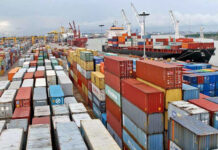Omicron, the new variant of the COVID-19 virus, has begun to have an impact on business. During this time, the country’s export trade has decreased. Traders fear that if the transmission of Omicron lasts for much longer, it will have a long-term impact on the export sector.
The recent survey conducted by the South Asian Network on Economic Modelling (SANEM) which is titled “New wave of COVID-19: Where does Business Confidence stand?’ has raised such fears among traders.
According to the survey, the impact of Omicron has reduced the exports or sales of 71% of the companies. According to 89% of the companies, Omicron has increased the risk of exports declining. 90% of companies say that Omicron has increased the risk of cost overruns for a variety of reasons, including additional health precautions. 91% said it increased the risk of raised capital and labour costs. Traders believe that the impact of Omicron may grow in the future. They want re-incentives from the government for this.
Selim Raihan, Executive Director of SANEM, presented the keynote address of the survey. The organisation conducted the survey from 3 to 24 January of this year. A total of 502 companies from 38 districts in eight divisions across the country took part in this survey. Of these, 252 are manufacturing factories and 250 are service sector companies.
Introducing the main article of the survey, Selim Raihan said, ‘As we have seen in the survey, businesses are not recovering the way traders expected them to. All the recovering companies are big companies. The government’s incentive package for their recovery has been effective. The pace of recovery of relatively small and medium companies is very slow.’ He called on the government to provide incentives to these companies as soon as possible.
According to SANEM’s survey, 69.23% of traders of small and medium-sized businesses said that they want government incentives. 97% of traders said that rising oil prices are driving up all kinds of costs. 70% said that they had to take loans for the last three months to run the businesses. Most of these loans are from their relatives. Due to corruption and lack of necessary documents, traders of small and medium businesses are having to rush getting loans.
SANEM said that when they went to collect data on the impact of rising fuel prices, they saw that it had already had an effect on traders. According to 97% of the companies, the increase in fuel prices has led to an increase in the cost of transportation. According to the survey, 79% of the companies said that their production costs have increased.




